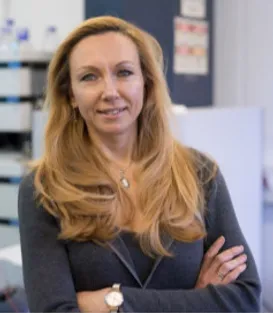Prof. Dr. Ivana Ivanović-Burmazović
Prof. Dr. Ivana Ivanović-Burmazović
Department Chemie
Ludwig-Maximilians-Universität München
Butenandtstr. 5-13, Haus D
81377 München
Germany
Office: +49 (0)89 2180-77406 (Annette Rogge)
Phone: +49 (0)89 2180-77404
Room-Nr. D2.032
Email:

Short CV
- 1993 Diploma in Chemistry, University of Belgrade, Serbia
- 1997 Magistra, University of Belgrade, Serbia
- 1999 PhD, University of Belgrade, Serbia
- 2000-2003 Assistant Professor, University of Belgrade, Serbia
- 2008 Habilitation, Friedrich-Alexander University, Erlangen-Nürnberg
- 2008 Offer for a professorship of Bioinorganic Chemistry at the University of Texas at Arlington, USA (declined)
- 2008 Professor (W3, Chair of Bioinorganic Chemistry), Erlangen-Nürnberg
- Since 2020 Professor (W3, Chair of Bioinorganic Chemistry and Coordination Chemistry), LMU, Munich
Education
- 1991 Practice, Prof. David Crich, Department of Organic Chemistry, University of Illinois, Chicago (USA)
- 1993 B.Sc. Faculty of Chemistry (R&D course), University of Belgrade, Serbia
- 1997 M.Sc. Faculty of Chemistry, University of Belgrade, Serbia
- 1999 D.Sc. Faculty of Chemistry, University of Belgrade, Serbia
Career
- 1993-1996 Research Fellow of the Serbian Ministry of Science & Technology (The Young Scientists' Research Fellowship Program)
- 1996-2000 Research and Teaching Assistant, Department of Inorganic Chemistry,University of Belgrade, Serbia
- 2000-2003 Assistant Professor of General and Inorganic Chemistry, Faculty of Chemistry, University of Belgrade, Serbia
- 2001-2003 Alexander von Humboldt Post-Doctoral Fellow, Prof. Dr. Dr. h. c. mult. R. van Eldik, University of Erlangen-Nürnberg, Germany Project title: Ligand substitution and reaction mechanisms of pentagonalbipyramidal complexes. Identification of hepta-coordinate species in solution
- 2004 Group Leader of the A8 Project (Siebenfach koordinierte Eisen- und Mangankomplexe mit Superoxyd-Dismutase-Aktivität als synthetische Enzyme) within SFB 583
- 2008 Habilitation in Inorganic Chemistry
- 2008 Offer for a professorship of Bioinorganic Chemistry at the University of Texas at Arlington (USA)
- 2008 Full Professor, Chair of Bioinorganic Chemistry (W3-Lehrstuhlinhaber für Bioanorganische Chemie) at the University of Erlangen-Nürnberg (Germany)
Fellowships / Honours
- 1991 International Best Students Research Exchange Award
- 1993-1996 The Young Scientists' Research Award Program, Serbian Ministry of Science & Technology
- 2001-2003 Alexander von Humboldt Fellowship
- 2003 Frauenförderung aus dem Hochschul- und Wissenschaftsprogramm- Universität Erlangen-Nürnberg
- 2004Inorganic Reaction Mechanisms Meeting (Athens/Greece) Price for the best young scientist oral presentation
Selected Functions
- 2008-2012 PI in the Graduate School "Molecular Science", supported by Bayern Excellent
- 2009 Member of the Emil Fischer Center
- 2010-2012 Editor-in-Chief of the “BioInorganic Reaction Mechanisms” (De Gruyter)
- since 2010 Associated executive board member (erweiterer Vorstand) of the Erlanger Center for Infection Research (ECI)
- 2010-2012 Deputy of the Chair for Inorganic and Analytical Chemistry
- 2011-2020 Speaker for Internationalization at the Department of Chemistry and Pharmacy at FAU
- 2011- 2014 Coordinator/Leader of the Emerging Field: Medicinal Redox Inorganic Chemistry, at the University of Erlangen-Nürnberg
- since 2012 Guest-Editor of Advances in Inorganic Chemistry, Volume 64: Inorganic/Bioinorganic Reaction Mechanisms (Elsevier)
- 2013 Organizer of “Redox modulation of health and disease: From inorganic chemistry to translational medicine”, as a satellite meeting (20-22 July, 2013) of the International Conference on Biological Inorganic Chemistry (ICBIC 16)
- since 2019 Member of the Editorial Board of the Journal of Inorganic Biochemistry (Elsevier)
Reviewer for: Journal of the American Chemical Society, Inorganic Chemistry, Chemical Communications, Dalton Transactions, Angewandte Chemie, Chemistry a European Journal, European Journal of Inorganic Chemistry, Journal Inorganic Biochemistry, Catalysis Science & Technology, DFG (German Research Foundation), Alexander von Humboldt-Stiftung (AvH) and The Austrian Science Fund (FWF).